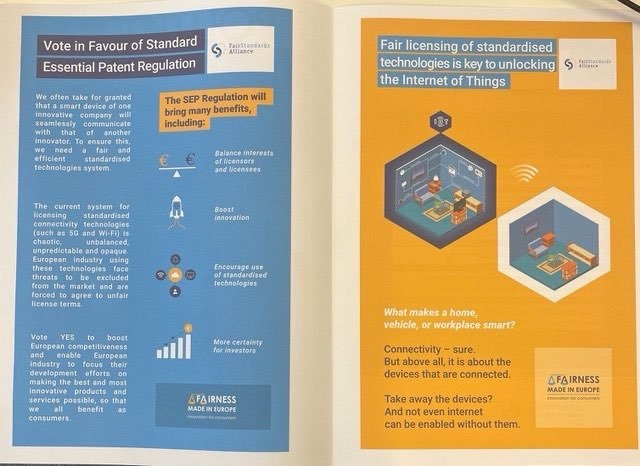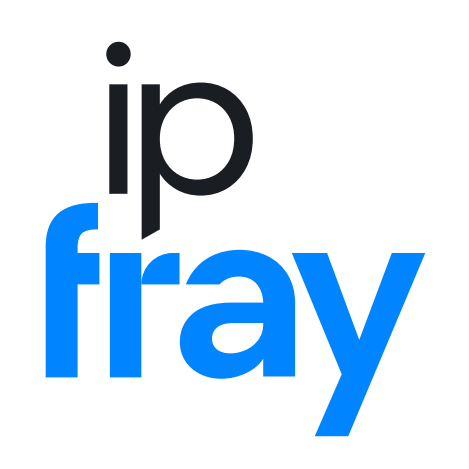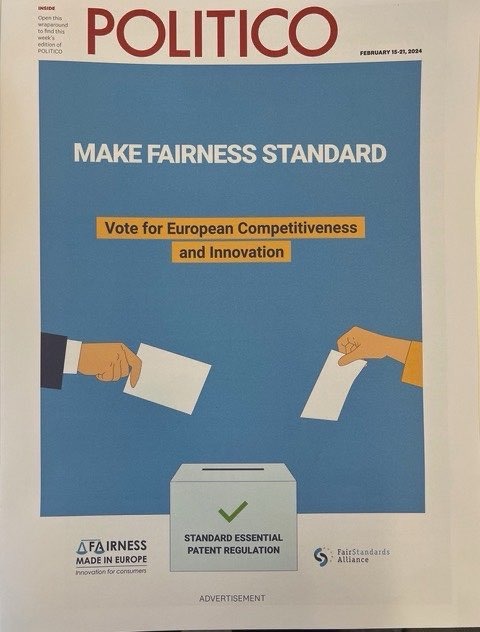Context: The European Parliament is rushing to a plenary vote next Tuesday (February 27, 2024) on the proposed EU regulation on standard-essential patents (SEPs). But only a narrow majority of Legal Affairs Committee (JURI) members supported the bill (January 24, 2024 ip fray article).
What’s new: There’s a conspicuous advertising campaign going on in Brussels, telling MEPs to vote for the proposal. In addition to advertisements, there are sponsored opinion pieces. While it is obvious that Apple and potentially other Big Tech companies are bankrolling that publicity effort, the money is routed through lobbying entities and a small Dutch law firm. One of the lobbying entities incredibly claims to represent the interests of small and medium-sized enterprises while openly admitting (finally) that 100% of its funding comes from large tech companies.
Direct impact: Advertisements as a means of lobbying ahead of decisions can serve two purposes. It demonstrates that there are economic interests behind a cause, and decision makers may factor in that such advertisements influence voters and, more generally, public sentiment. Neither factor should make a difference in this case: the obvious economic interest in bringing down patent licensee fees is not probative of any problem to be solved nor of the suitability of a proposed solution. It merely shows that some companies believe lobbying for SEP devaluation yields a high return on investment, whether their arguments have merit or not. And given the size of the EU, the audience reached by those ads doesn’t move the needle in terms of voter sentiment ahead of the elections. Furthermore, some politicians view such advertisements as a potential sign of weak arguments that must be reinforced with money.
Wider ramifications: The EU institutions would be well advised to revise their lobbying transparency rules in light of ACT | The App Association’s deceptive tactics. An organization that admittedly receives 100% of its funding from large corporations must not be allowed to lobby the EU institutions in the name of small and medium-sized enterprises (SMEs).
In ip fray‘s estimate, just the payments to Politico’s EU edition and the (Brussels-based) Parliament Magazine must amount to hundreds of thousands of euros already. That does not even include payments to guest authors and those producing economic advocacy material such as Charles River Associates (February 4, 2024 ip fray article). All costs taken together will easily be in the millions of euros already.
It bears mentioning that the next step is only a first-reading vote in the European Parliament, after which there may be a trilogue followed by a second-reading vote. In the meantime, quite a number of the MEPs targeted at this point will retire or lose their reelection bids in a matter of months.
The Fair Standards Alliance (FSA), which was co-founded by Apple and Intel, lists its members, but it is not disclosed how much each member contributes. That is normal for such organizations, but the scale of the ongoing campaign and the enormous emphasis placed on a “transparency” argument (January 29, 2024 ip fray article) would not make it unreasonable to ask for more information. Future disclosures show in the EU Transparency Register may shed some light on this.
The wrapper around Politico’s February 15-21, 2024 print edition shown in the title graphic above was presumably the single most expensive placement. This is what the inside part of the wrapper looked like:

The FSA also sponsored the placement of editorial content—a policy statement by a Continental executive—in the Parliament Magazine yesterday (February 21, 2024 Parliament Magazine advertorial).
Among the persons quoted in that piece, one can find “Nicholas Banasevic, a former Acting Director at the European Commission’s DG COMP.” Nowhere do they mention that he, without even being a lawyer, was made the managing partner of the Brussels office of an Apple-aligned law firm. Transparency be damned.
There’s also a quote by AVM, a German company that describes itself as “medium-sized” but is actually far outside the EU’s SME definition and looking to be sold for a billion-dollar price to a most likely foreign acquirer. The Munich I Regional Court has identified AVM as a clearly unwilling licensee (December 26, 2023 ip fray article). The court’s introductory remarks at a hearing suggested that AVM never seriously engaged in SEP licensing negotiations in the relevant case.
The same Continental executive in whose name yesterday’s Parliament Magazine piece was published also authored an FSA- sponsored Politico article (Give innovators the boost they need: fairness and transparency) that appeared on February 12, 2024.
A week later, tiny Belgian law firm Camesasca Bvba (apparently a solo practitioner) sponsored content (EU competitiveness and licensing of essential technologies) written by its owner, Mr. Peter D. Camesasca, together with Charles River Associates’ Apple lobbyist Benno Buehler. In a LinkedIn debate, Mr. Camesasca confirmed the obvious: his clients include technology (including, but not limited to, automotive) companies.
In between the FSA’s and Mr. Camesasca’s Politico pieces, there was also one (An SME’s call for fair play in the SEP landscape) paid for by the most deceptive lobbying front to be active in connection with SEP policy as well as app store regulation, ACT | The App Association. The SME in whose name the article was published, Lucidcircus, is not an EU company but based in the U.S., and more importantly, it’s simply a design and development service provider that doesn’t have to license SEPs in order to release products (and given the field in which they work, it’s hard to imagine that even any of their customers have to license SEPs in connection with what Lucidcircus develops for them on a contract basis).
The following X (formerly known as Twitter) post by a Brussels-based consultant who is critical of ACT’s activities discusses a full-page ad and highlights a disclosure:
Let’s look at the relevant passage again:
“The App Association works with sponsors like Amazon, Apple, Continental, Intel, Verisign, and Verizon to provide a no-cost membership for the small and medium-sized business that want to be involved in advocacy and have their voice heard when it is all too often ignored.”
Seriously, how can anyone in their right mind believe that?
The people running ACT are lobbyists. They are paid by tech companies, and according to a 2022 Bloomberg article, there was at least an extended period (which may never have ended) when Apple contributed the vast majority of its funding, as even ACT had to concede when asked by Bloomberg. There is no way that an organization that receives zero fees from SMEs and 100% of its funding from Big Tech can reasonably claim to represent SMEs. They’re astroturfers: they claim to be something they aren’t, for a political purpose.
The EU should launch an inquiry, and EU politicians and officials should decline to meet with ACT because of its deceptive lobbying. It is an insult to human intelligence that someone will work for entities that provide zero fees and don’t get to decide (by a membership vote) on who runs the organization.
ACT has paid for sponsored messages in Politico’s EU Playbook newsletter (two messages that appeared every single day of a week; they could have used different texts each time, but elected to just be repetitive):


As for the rates, Politico charges €50K per week for text that goes into its daily Brussels Playbook newsletter, €18K for a sponsored article, and €8.5K/day for a “homepage takeover” ad. The wrapper around the print edition will have dwarfed those costs. Even though there may be volume discounts for those who buy a package of advertising placements, the overall effort here is easily in the hundreds of thousands of euros, not counting the costs of the likes of Charles River Associates.
Finally, with a view to ACT’s deceptive lobbying in the name of SME’s (and in the pocket of Apple and others), ip fray would like to note once again that the SME-friendliest proposal anyone has put forward in connection with the EU SEP Regulation was made in a February 10, 2024 ip fray article. One of the members (in fact, the most active member) of the research group commissioned by the European Commission’s Directorate-General for the Internal Market (DG GROW) ahead of the legislative proposal responded with an open mind on LinkedIn, arguing that such ideas should be discussed and considered now as opposed to adopting the current proposal. The only major EU-based patent pool administrator equally expressed an open mind, while stating reservations concerning the part relating to SME Licensing Negotiation Groups (LNGs). On this occasion, ip fray would like to clarify that the objectives of its SME-centric proposal can be fully achieved by merely allowing SMEs to split the costs of a FRAND determination, without authorizing group boycott or any other abusive conduct.

